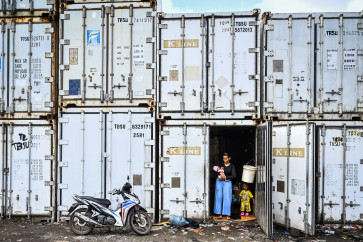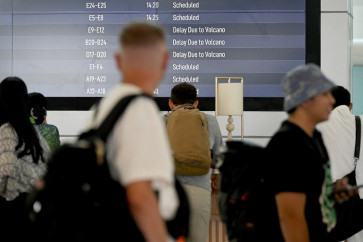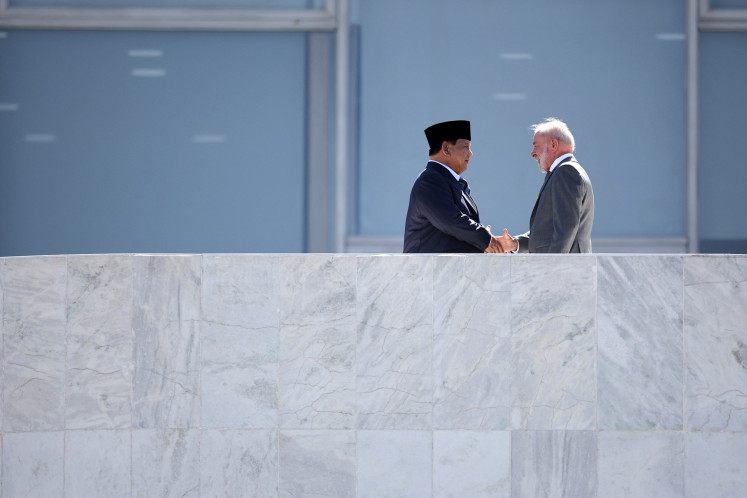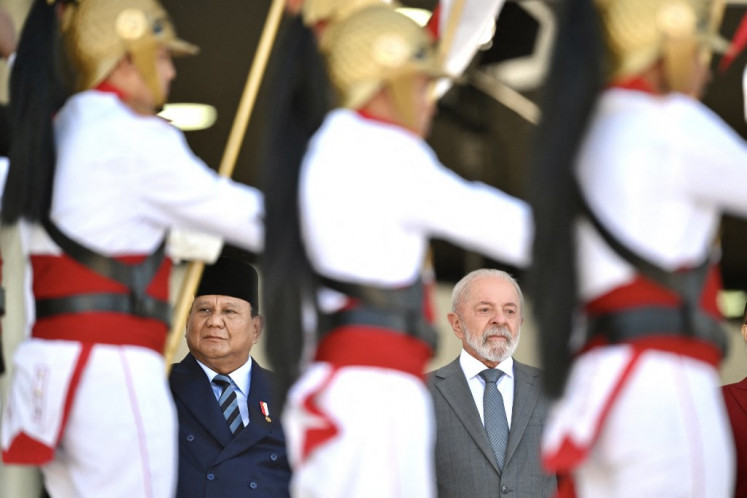Popular Reads
Top Results
Can't find what you're looking for?
View all search resultsPopular Reads
Top Results
Can't find what you're looking for?
View all search resultsNuclear power and norm entrepreneur
President Susilo Bambang Yudhoyono recently stated that the development of a nuclear power plant is not the priority of his government amid strong public resistance to the government’s plan to build a nuclear power site in Muria, Central Java or Madura, East Java
Change text size
Gift Premium Articles
to Anyone
P
resident Susilo Bambang Yudhoyono recently stated that the development of a nuclear power plant is not the priority of his government amid strong public resistance to the government’s plan to build a nuclear power site in Muria, Central Java or Madura, East Java.
By staging massive demonstrations, building tactical coalition from anti-nuclear activists to a political party, and continuous efforts to lobby against the nuclear plan, the nuclear opponents managed to force the government to keep the plan idle.
Nevertheless, just as an Indonesian proverb says, “the dogs bark, the caravan moves on”, the government seems to be proceeding with the plan. In short, the nuclear project polarizes both sides with no room for common understanding.
If not resolved, such polarization would only create further hurdles in implementing a nuclear power project as desired by the policy. More resistance will arise and only more defensive statements will be taken by the authority.
Sulfikar Amir (2009) posited that the sociopolitical divergence regarding the nuclear issue is basically rooted from both sides’ epistemological differences.
Civil society possesses its own civic epistemology in understanding nuclear plan, which is based on humans’ experiences in dealing with nuclear. Whereas, the government represented by the National Nuclear Energy Agency (BATAN), Research and Technology Ministry, and Energy and Mineral Resources Ministry, adheres to their expert epistemology: Unreserved belief for the credibility of science and technology. This is what has made nuclear a political issue since its inception.
Is the epistemological divergence then reconcilable? At a glance, what seems to be taking place regarding the nuclear issue is a conflict of interest between political groups, i.e. the pro- and anti-nuclear elements hence irreconcilable.
But if we look into it more thoroughly, what is occurring is a clash of ideational structures between those diverging groups.
Epistemology concerns with how ideas are shaping the behaviors of social and political actors. Systems of shared ideas, beliefs and values then have structural characteristics and they exert a powerful influence on social and political action (Reus-Smit, 2005).
When ideas clash, there is a social mechanism called “inter-subjectivity” where different subjects or individuals with different ideas in mind engage in a search of a shared belief among themselves. This would be their social norm in achieving common goals.
In short, what seems to be oppositional interests in the nuclear issue could be reconciled by promoting more communication among actors.
In this regard, a “norm entrepreneur” is critically needed to reconcile the diverging epistemologies and ideas on Indonesia’s nuclear power dispute. According to Finnemore and Sikkink (1998), a norm entrepreneur is an actor that advocates different ideas about appropriate behavior from organizational platforms that give their ideas credence.
They work to persuade other actors to alter their behavior and beliefs in accordance with the norm entrepreneur’s ideas about how actors should behave and think (Sterling-Folker, 2006).
Shall the government insist with the nuclear power program — justifying it as a national mandate to accomplish — it has to remind itself, like it or not, to the heyday of the New Order in the 1990s when achieving its ambitious nationalist aircraft industry was spearheaded by the then minister B.J. Habibie.
The idea was initially disputed very harshly by some political elements that such a project was too ambitious. Such political pressure forced the then research and technology minister to advocate a nationalist norm and convince the opposition that the aircraft project was a way of concreting Indonesian technology nationalism (Amir, 2009), hence gaining international respect. In the end, the nationalist project proved itself as true: N250 Gatotkaca made its maiden flight and all, including opposition, marveled at it.
Despite its subsequent collapse of the nationalist project together with the crumbling Order, there is one thing that the current government should learn regarding the nuclear issue: It takes a “norm entrepreneur” to resolve politically-sensitive agenda.
This is exactly what the two-time Yudhoyono administrations have been lacking in dealing with the issue. It may possess a strong pro-nuclear organizational platform such as BATAN, the Nuclear Energy Regulatory Agency, Research and Technology Ministry, Energy and Mineral Resources Ministry, the parliament, and the National Energy Policy 2005.
But, none from above-mentioned bureaucrats and technocrats seems to be able to act as the intended norm entrepreneurs in showing nuclear power technological achievement, either as a collective national project or a renewable energy “good for the people”.
Each has been confined in their own policy sectors, disciplines, simply carrying out what their duties oblige without any serious efforts to align their expert and civic epistemologies.
Worse, the nuclear issue becomes political only as part of logrolling between political parties and their constituencies. Pro-nuclear parties may turn out to be opposing the idea when nearing election to gain the electoral upper-hand. The risk-averse president too could not avoid this pragmatism by stating that the “nuclear power plant is not a priority”, while he had pledged to proceed with the plan in his early tenure (The Jakarta Post, June 18).
The absence of a nuclear norm entrepreneur may basically reflect that our national leadership, not only in the political field but also in technological and cultural terms, has been lacking relevant capacity in dealing with sensitive issues.
If this absence continues to be unanswered by our leaders and becomes idle for good, Indonesians may only act as bystanders seeing other neighboring countries currently advance their nuclear power programs.
The writer is director of the Institute of International Studies (IIS) and lecturer at the Department of International Relations, Faculty of Social and Political Studies, Gadjah Mada University.










